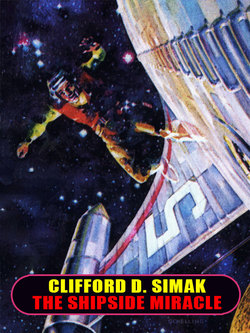Читать книгу The Shipside Miracle - Clifford D. Simak - Страница 4
THE SHIPSHAPE MIRACLE
ОглавлениеIf Cheviot Sherwood ever had believed in miracles, he believed in them no longer. He had no illusions now. He knew exactly what he faced.
His life would come to an end on this uninhabited backwoods planet and there’d be none to mourn him, none to know. Not, he thought, that there would be any mourners, under any circumstance. Although there were those who would be glad to see him, who would come running if they knew where he might be found.
These were people, very definitely, that Sherwood had no desire to see.
His great, one might say his overwhelming, desire not to see them could account in part for his present situation, since he had taken off from the last planet of record without filing flight plans and lacking clearance.
Since no one knew where he might have headed and since his radio was junk, there was no likelihood at all that anyone would find him—even if they looked, which would be a matter of some doubt. Probably the most that anyone would do would be to send out messages to other planets to place authorities on the alert for him.
And since his spaceship, for the lack of a certain valve for which he had no replacement, was not going anywhere, he was stuck here on this planet.
If that had been all there had been to it, it might not have been so bad. But there was a final irony that under other circumstances (if it had been happening to someone else, let’s say), would have kept Sherwood in stitches of forthright merriment for hours on end at the very thought of it. But since he was the one involved, there was no merriment.
For now, when he could gain no benefit, he was potentially rich beyond even his own most greedy and most lurid dreams.
On the ridge above the camp he’d get up beside his crippled spaceship lay a strip of clay-cemented conglomerate that fairly reeked with diamonds. They lay scattered on the hillside, washed out by the weather; they were mixed liberally in the gravel of the tiny stream that wended through the valley. They could be picked up by the basket. They were of high quality; there were several, the size of human skulls, that probably were priceless.
Sherwood was of a hardy, rough and tumble breed. Once he became convinced of his situation he made the best of it. He made his camp into a home and laid in supplies—digging roots, gathering nuts, drying fish and making pemmican. If he was to be cast in the role of a Robinson Crusoe, he proposed to be at least comfortably well fed.
In his spare time he gathered diamonds, dumping them in a pile outside his shack. And in the idle afternoons or the long evenings, he sat beside his campfire and sorted them out—washing them free of clinging dirt and grading them according to their size and brilliance. The very best of them he put into a sack, designed for easy grabbing if the time should ever come when he might depart the planet.
Not that he had any hope this would come about.
Even so, he was a man who planned against contingencies. He always tried to have some sort of loop-hole. Had this not been the case, his career would have ended long before, at any one of a dozen times or places. That it apparently had come to an end now could be attributed to a certain lack of foresight in not carrying a full complement of spare parts. Although perhaps this was understandable, since never before in the history of space flight had that particular valve which now spelled out Sherwood’s doom ever misbehaved.
Perhaps it was well for him that he was not an introspective man. If he had been given to much searching thought, he might have found himself living with his past, and there were places in his past that were far from pretty.
He was lucky in many other ways, of course. The planet was not a bad one, a sort of New England planet with a rocky, tumbled terrain, forested by scrubby trees and distinctly terrestrial. He might just as easily have been marooned upon a jungle planet or one of the icy planets or any of another dozen different kinds that were not tolerant of life.
So he settled in and made the best of it and didn’t even bother to count off the days. For he knew what he was in for.
He counted on no miracle.
* * * *
The miracle he had not counted on came late one afternoon as he sat, cross-legged, sorting out his latest haul of priceless diamonds.
